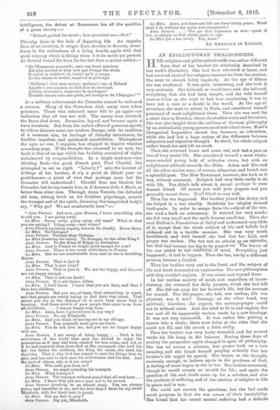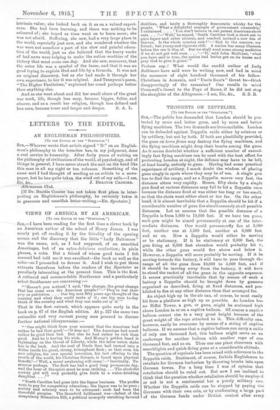AN ENGLISHWOMAN PHILOSOPHIZES.
HER religious and philosophical outfit was rather different from that of her brother (so admirably described in last week's Spectator). She had been educated at home, and had received most of her religious instruction from her mother. She went to church fairly regularly. At the age of fifteen she was confirmed. It was quite interesting, and she took it very seriously. She believed, or would have said she believed, everything that she had been taught, and she told herself once or twice as she went to bed how comforting it was to have not a care or a doubt in the world. At the age of seventeen she went to school in Paris, and considered herself possessed of most enlightened views. Then she was sent for a short time to Dresden, where she studied music and literature. She was also taught there the outlines of German philosophy by an enthusiaatio young governess of individual views. Kant's Categorical Imperative struck her, however, as colourless, while she had but a hazy notion of the difference between subjective and objective thought. In short, the whole subject rather bored her and left no mark.
Then she returned home and came out, and had a year or two of busy social life, She considered herself a most whole- some-minded young lady of orthodox views, but with an enlightened attitude towards the Bible. Adam and Eve and all the other stories were, of course, allegories, and Isaiah was a splendid poet. The New Testament, however, she took as it was, without comment. Religion had very little really to do with life. You didn't talk about it, except perhaps to your dearest friend. Of course you said your prayers and you generally meant them. It all fitted in very well.
Then the war happened. Her brother joined the Army, and she helped in a war charity. Suddenly her religion seemed inadequate. In order to escape from the subject of the war, she read a book on astronomy. It worried her very much; she felt very small and the earth became small too. Then she read Balfour's Foundations of Belief and understood very little of it, except that the whole subject of life and beliefs had widened out in a terrific) manner. She was very much bewildered, and told herself she had lost her faith and prayer was useless. She was not an atheist or an agnostic, but God had become too big to he prayed to. The horror of the war added to her confusion of mind. Everything just happened ; it had to happen. Thus she too, but by a different process, became a fatalist.
Then her brother went out to the front, and the subject of life and death demanded an explanation. Her new philosophers said they couldn't explain. It was above and beyond them.
In her restless anxiety of mind, and regardless of incon- sistency, she resumed her daily prayers, which she had left off. She did not pray for her brother's life, but for courage for herself. The life-prayer, she felt, was useless; life was physical, was it not P Courage, on the other band, was spiritual; therefore, she argued, the courage-prayer could not be without value. And she tried to fit in and explain the war and all its apparently useless waste by a new theology. It was not very successful. It was rather like putting a square into a circle; there were holes at the sides that she could not fill, and life struck a little chilly.
Then her brother was very badly wounded, and for several weeks his life hung iu the balance. During those days of anxiety the perspective again changed in spite of philosophy. She was no nearer a solution, but prayer took on a new meaning, and she found herself praying ardently that her brother's life might be spared. She began, as she thought, curiously enough, to believe again in the goodness of God. A feeling of trust began to stir in her. Her brotherrecovered, though he would remain an invalid for life ; and again the question of life and death came up for a solution, and also the problem of suffering and of the relation of religion to life in peace and in war.
She could not answer the questions; bat she had made much progress in that she was aware of their insolubility. She. found that her recent mental suffering had a definite intrinsic value; she looked back on it as on a valued experi- ence. She had been learning, and there was nothing to be ashamed of ; she hoped as time went on to learn more; she was not afraid. Suffering, she saw, bad a very large place in the world, especially just now, and she wondered whether the war were not somehow a part of the slow and painful educa- tion of the world, just as she believed that the heavy weeks of bad news were helping to make the nation worthier of the victory that must come one day. And she saw, moreover, that the outer life was a symbol of the inner, and that it was no good trying to explain God and life by a formula. It was not an original discovery, but as she had made it through her own experience, to her it was original. And Tennyson's poem, "The Higher Pantheism," explained her creed perhaps better than anything else.
And as she went about and did her small share of the great war work, life, though less easy, became bigger, fuller, and clearer, and as a result her religion, though less defined and less sure, became truer and larger and deeper. S. A. L.

















































 Previous page
Previous page